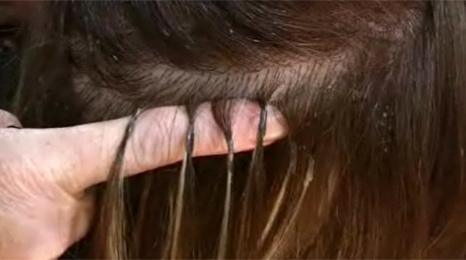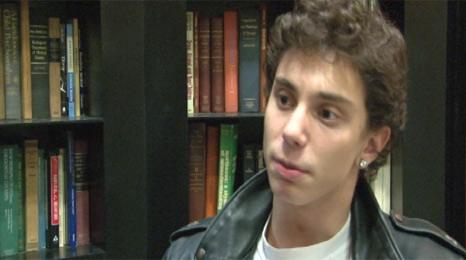Hair extensions 'should be banned'
- Published

Hair extensions should be banned, according to one of the biggest hair science groups in the UK.
The Trichological Society says a growing number of salons are offering to do them at a cheap price and some hairdressers don't have the qualifications to put them in properly.
The organisation says that's leading to more young women suffering from hair problems such as bald patches and alopecia.
Barry Stevens is a hair scientist who runs the group.
He said: "People who have hair extensions usually have high hopes they'll look and feel good but very often it ends in tears.
"There can be quite serious consequences wearing them for a long period. They are capable of destroying hair permanently."
A report published in the British Journal of Dermatology also warns people about the possible dangers of hair extensions.
Researchers in the US and Italy say problems with them are more common than reported.
Scalp problems
The report says some women have no visible signs of hair loss even though their scalp could be suffering when looked at more closely.
Barry Stevens has worked with many women who've taken legal action after having their hair ruined by extensions.
After years of examining hundreds of women's hair and scalps, he thinks extensions which are glued-in, sewn-in or attached with a metal ring should be banned in the UK.
"Hair extensions pull out one's natural hair," he warned. "They're heavy, don't absorb water easily and can tangle very quickly."
He also says because hair extensions have grown in popularity, buying the hair is much cheaper than it used to be and more salons are offering to put them in at a reasonably cheap price.
He added: "The quality of hair can make a big difference. Any poor quality hair will snag with brushing and combing and eventually rip your hair out."
'Poor quality'
But Shola Rose, who's been a hairdresser in London for more than 12 years, doesn't agree with calls to ban hair extensions.
She said: "If you have extensions, you should have them done properly, in terms of how often you have them removed and have them washed.
"If your hairdressers tell you to have a break, then you should take one, not go to another shop. Only qualified hairdressers should apply them.
"Some hair salons do them at a bargain price and the hair is of a poor quality. I do think there should be a governing body for hairdressers which we don't have at the moment in the UK."
Barry Stevens also thinks all young black and mixed race children shouldn't have their hair braided, plaited, canerowed or have extensions added.
"Their hair shouldn't be controlled at a young age. Braiding and plaiting can pull the hair and it can be too tight on the scalp, causing problems like a receding hair line, baldness and hair loss."
Hairdresser Shola Rose isn't convinced though.
She said: "Having you hair canerowed or plaited is embedded in the black culture. He's not being realistic. Sometimes plaits are good for the hair."
Eighteen-year-old student Sonja Elair from Clapham in London regularly has hair extensions.
"Hair extensions are generally quite good but it all depends on how you have them done," she said.
"If you use a lot of glue then it can damage your hair but if you sew-in the hair it actually grows it. Canerowing your hair also helps grow it.
"You should stick to one person doing your hair as they'll be able to monitor your hair on a regular basis."
- Published1 December 2009

- Published3 December 2009
